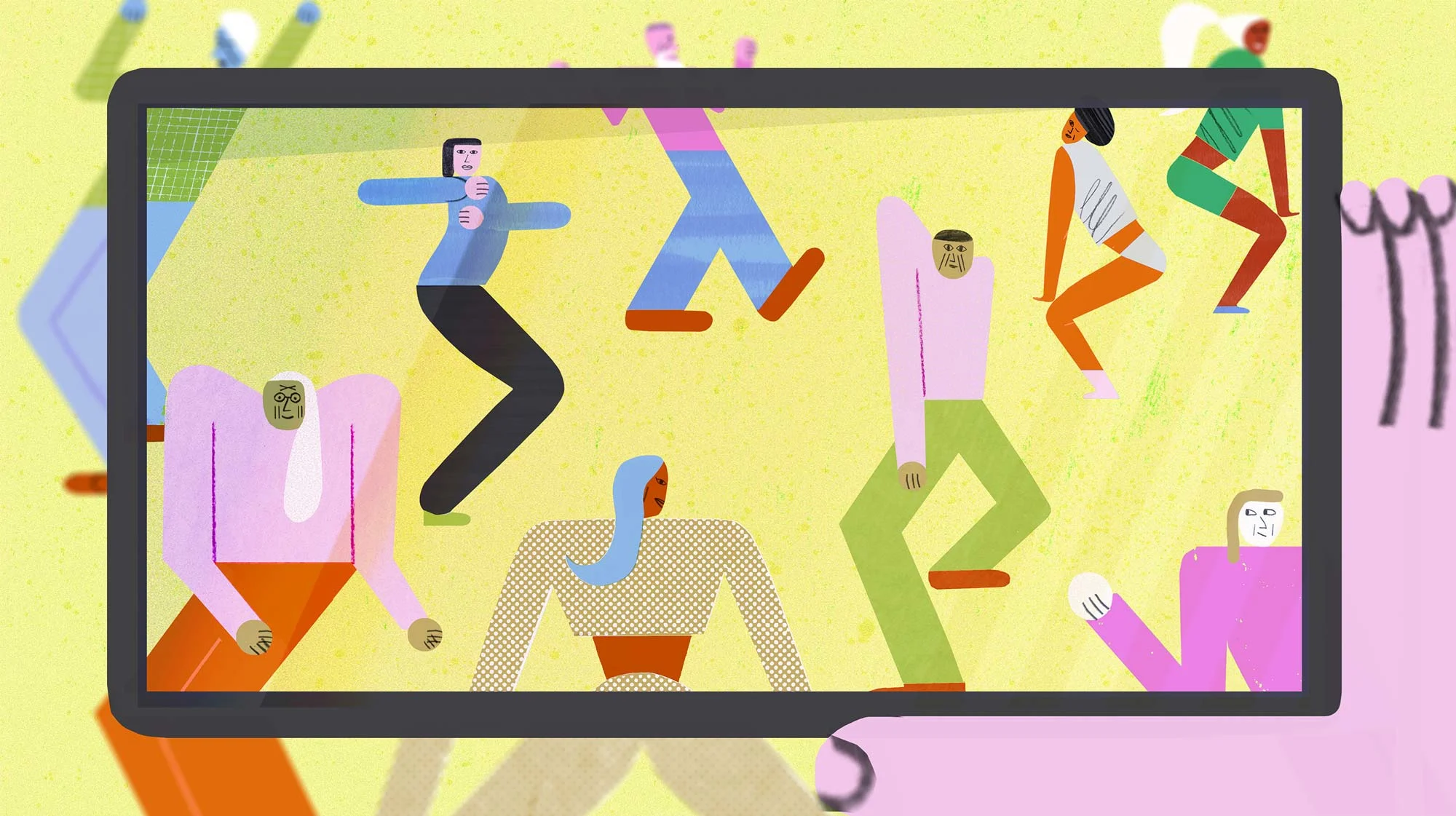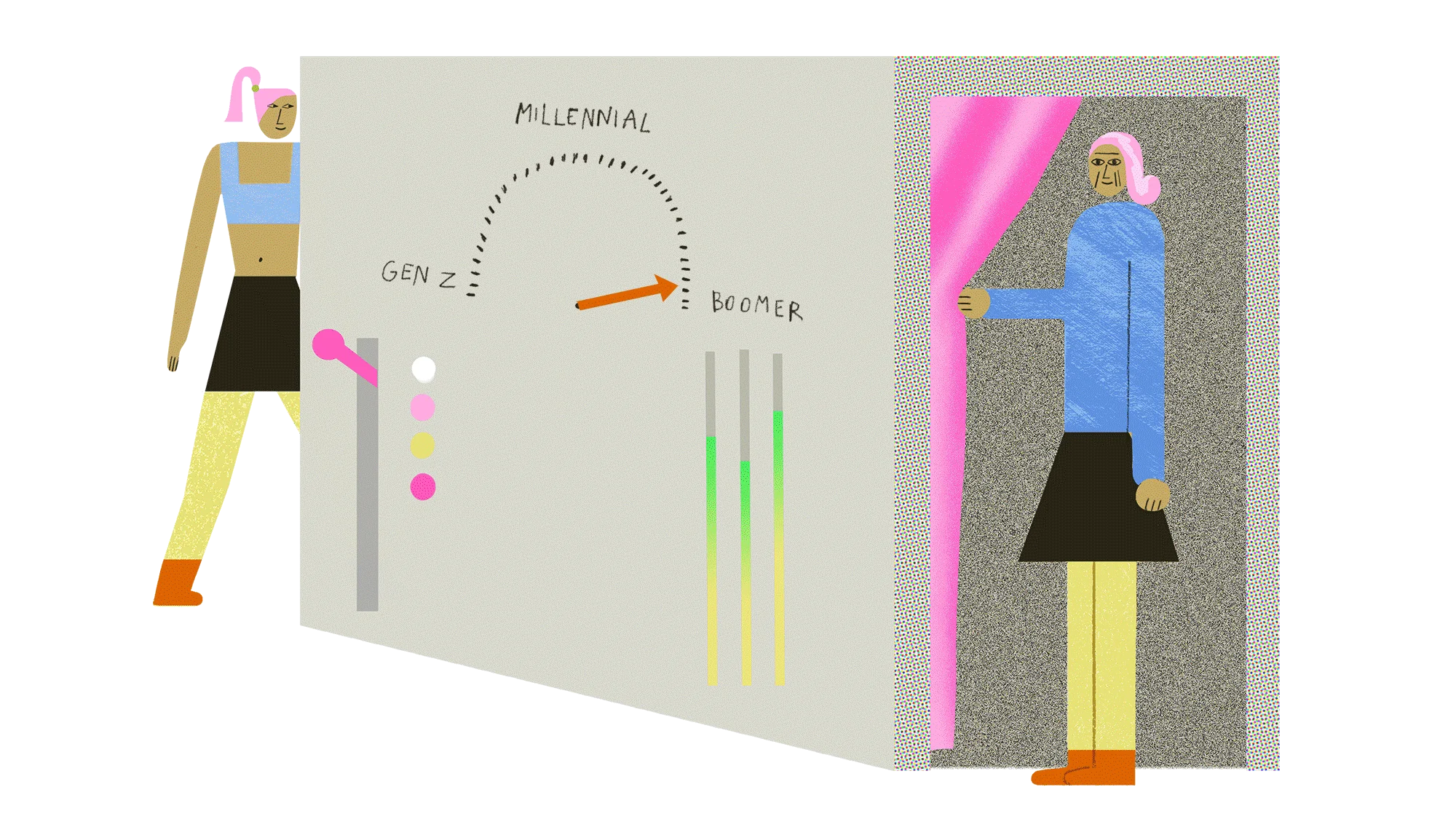

So much for ‘OK boomer’. These days, many members of Gen Z seem to be morphing into their baby boomer counterparts, dressing in a wardrobe of #coastalgrandmother knits and neutrals, hating on millennials, and putting their own whims over the future of the planet. Here, writer Trey Taylor looks into the unexpected generational crossover.
Artwork by Irene Servillo.
Have you heard? Old people are cool now. Baby boomers are increasingly flooding TikTok (7% of users are now over 50), aging up the app’s user base with their sincere “Is this thing on?” queries—and Generation Z is eating it up. “A serve,” one comments. “Instant follow,” proclaims another. These could be comments on any boomer’s video, but they are just a sample of those given to the Connecticut couple behind the account @emptynester3, in which two parents sit in their car and review their Dunkin’ coffee.
“What did you get, dad?” the wife asks theatrically to the camera.
“Delicious… medium ice, milk, shug,” the husband replies.
“Oh, and the shugs, how menn?” the wife says (meaning “sugar” and “many” respectively).
“Four!” he chirps back.
A comment from a user with the handle @sweettooots: “I’m living for the shortening of words.”
These word surgeons have more than 100,000 followers and only 11 public videos at the time of writing, which have received a sum total of 1.4 million likes. They’re a caricature of the type of finally-free coastal elites who have the house to themselves after the kids go away to college, filling the gap they left behind with suburban adventures. (In one video, husband Brian skips through a gift shop’s dress-up parlor costumed as Anne of Green Gables, complete with fake ginger braids and prairie dress.)
This spunky couple, with their fondness for unnecessary abbreviations, are, by long-established standards, perfectly set up for online mockery by teens. Instead, their sincerity is Teflon for derision, embraced by those with a still-forming frontal cortex. But their behavior is indicative of a wider trend: there’s evidence suggesting that Gen Z (those born between 1997 and 2012) are emulating the behaviors and adopting values attributed to baby boomers—the “Me” generation born between 1946 and 1964.
There is a boomerification of Gen Z happening all around us. “The way that Gen Z acts on TikTok and boomers act on Facebook? Literally the exact same energy,” says millennial TikToker @flower_sea_sand in the first of several videos drawing what she calls “Boomer to Zoomer” parallels. Both generations, she explains, “love to hate millennials, love to be up in the comments section of different brands complaining about this ad campaign or whatever perceived slight that the brand has committed. They love to try to get people fired from their jobs, and try to expose people.” She knows, she says, because she is a social media manager for a brand.

The self-victimization that a vocal progressive faction of Gen Z is becoming known for is writ large in “whataboutism” comments on TikTok, warning that one segment of the population—and not necessarily one the commenter belongs to—might take offense to a given post. (This one is my personal favorite: a man dressed up as a witch mimes curb-stomping a child who has refused to say “trick or treat.” The post is quickly condemned as ableist by commenters for seemingly discriminating against non-verbal children.)
When her initial video comparing generational behaviors received more than 520,000 likes, @flower_sea_sand followed up with more examples. “Boomers and Gen Z love to tell people to go back to where they came from,” she continued. “Boomers tell that to immigrants and Gen Zers in big cities like to tell that to people who move to Los Angeles or New York.” A search for “border secure” on Twitter will unearth tweets like these from conservative boomers, which are perhaps less expected than TikToks of Gen Z users telling their peers to leave cities like New York and LA and “move back to Milwaukee.”
This Gen Z-boomer crossover isn’t restricted to TikTok. Elsewhere, near-adolescents are seeking escapism through a drip feed of nostalgia. A Spotify report on listening habits noted that 68% of Gen Z likes “listening to and watching media from earlier decades, because it reminds them of when things were less complicated.” Aesthetics called “coastal grandmother” (which has over 232 million views on TikTok) and “cottagecore” (11.2 billion) have been trending, turning Gen Z into a pit bull on the pant leg of resale apps like Depop and Grailed, perpetually on the hunt for pearls and cozy neutrals.
The under-25 set wants to look like the coastal grandmother ideal: Diane Keaton in 2003’s “Something’s Gotta Give,” louchely unaware and smoothly puréed in an assorted palette of cream linens. In August 2022, citing the cottagecore decor in Keaton’s new film, “Mack & Rita,” the New York Times boldly declared that “Boomers are All the Rage.”
“I love sweater vests,” says YouTuber Emma Chamberlain, an archetype of her generation, as she exults in her collection of sweater vests on a recent tour of her home for Architectural Digest. “I especially take inspiration from people in their 60s. They’re a really good source of inspiration. Like a cool grandpa wearing a vest with a cool shirt under it? Chic!”
These are mostly aesthetic observations. But there is also a fundamental connection shared over material topics. Consider climate change: there are denialists of every age and demographic, but baby boomers are particularly unconcerned about America’s reliance on fossil fuels, though they have the largest carbon footprint. Just a quarter of boomers surveyed by the Pew Research Center in 2021 felt that the U.S. should phase out fossil fuels, compared to 43% of Gen Z adults and 42% of millennials.
But while those under 25 appear to care about social justice and climate change, but only insofar as it doesn’t undercut the perceived value of a deal. A joy of newness, apparent in that hit of dopamine when showing off a haul of new purchases on TikTok, motivates Gen Z to flip their secondhand finds faster than any other generation, according to a report by luxury resale platform TheRealReal. This same desire for newness means this eco-conscious generation “can’t quit fast fashion.” Their favorite, Chinese fast fashion company Shein, is vacant of morals and has now become the world’s largest online retailer thanks to its core demographic and guaranteed view count on TikTok. As Timothée Chalamet, the matinée idol for Gen Z, said on a press tour for a film about cannibalism, “Societal collapse is in the air.”
That doomsday sentiment is nothing new. But Gen Z, by every measure, has it bad. Pick your poison: economic ruin, a global pandemic, climate apocalypse, wealth inequality, widespread anxiety and isolation fortified by the neverending scroll… It becomes increasingly difficult to blame Gen Z for their rampant nihilism since capitalist systems—largely put in place by boomers and largely responsible for espousing division and unease—are unsustainable.
Members of Gen Z “talk openly about not wanting to follow the path of their parents and grandparents—working to exhaustion, with little time for family and individual pursuits, pledging loyalty to one job or industry,” according to a recent report from the Walton Family Foundation and the educational inequality nonprofit Murmuration. They are rightly dismissing the capitalist diktat that honest, hard work is unequally rewarded; and instead of suffering in silence, they are visibly breaking down about how they might never escape capitalism.
Most of this sounds awful. And it is. However, there is a silver lining. Sincere bonds between members of Gen Z and boomers are being forged on the For You page on TikTok. What older people have in spades is a wisdom that Gen Z genuinely yearns for—or an insouciant demeanor that is too silly not to like and follow.
This past summer, Steffi Cao, a Gen Z reporter at BuzzFeed, explored her fascination with glamorous older influencers. Among others, Cao cites 61-year-old retired fashion executive and creator Gym Tan, whose primary audience is women aged 18 to 24, as an example of boomers connecting with young audiences on TikTok. “Lifestyle content is meant to help you figure out how you want to live, so hearing from these women who have experienced long and complex lives… makes me more inclined to listen to their diet, shopping, beauty, and fitness tips—because they’ve truly lived to try it all,” Cao writes.

What is ironic in the reflective funhouse is the ageism lobbied not at boomers, but at millennials. Whenever a millennial wades into a TikTok conversation with an opinion that is not palatable to Gen Z, the most frequent comment on the video is “You’re old.” They have been the target of ire for their side parts, their skinny jeans, and for knowing what house they would have landed in at Hogwarts. The first generation to grow up on the internet has become the generation of squandered possibilities, avocado toast, and self-victimization. While millennials viewed Gen X as their cooler older siblings, Gen Z has skipped over a few generations to venerate baby boomers.
Can a generation’s defining traits become a cyclical trend that repeats? It is as if the pop culture body politic is cryogenically frozen, with certain parts thawed out and reanimated. But they are separated from the whole, from their point of origination.
Each generation had their era-defining subculture: mods, punk, grunge, hipsterdom. What is Gen Z’s apart from a smattering of ill-defined and mostly empty buzzwords like cottagecore? A peripheral analysis of the zeitgeist might suggest that Gen Z’s ideas are only as far reaching as an extended selfie arm. The majority of youth may see themselves as creative, but are they pushing culture forward in any ambitious or meaningful way?
Can a generation’s defining traits become a cyclical trend that repeats?
This likely stems not from a lack of access to information, but a lack of curiosity. An instant gratification is built into recycling or remixing ideas from previous generations for a TikTok hit. Baby boomers may be the inspiration for that aesthetic now, but Gen Z would be wise to remember the axiom “My culture is not a costume.” Or, in Boomerspeak, “Get off my lawn!”
Not every member of these respective generations acts in the ways I’ve described. However, the behavioral tendencies that are shared by these two disparate generations—one charming and authentic, and one cosplaying in their vintage clothing—is something to behold.
It is an evolutionary imperative that old people must be uncool, which is why this reach across the generational aisle isn’t happening in real life at grandma’s house, but through a pixelated screen in short, 30-second bursts. Contextless. Truculent. Hollow.
The internet flattens everything by nature, and cyclical trends are now observed across three exemplary TikToks. There is a “vibe shift.” We’re all aging. But upcoming generations have always held hope for the future of cultural civilization. They are the eyes brimming with curiosity, ready to kick down the front door to culture and make a declarative statement that will be remembered for decades to come. But Gen Z are not the brains of this operation. And until the time comes for this effort, you can find years of societal wisdom watered down into a digestible TikTok duet via a young influencer in your endless scroll.

